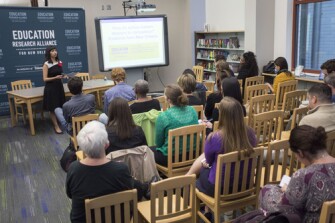
In a paper we released last week, Huriya Jabbar examined how school competition, generated by choice, drove principals to tailor school curricula and admissions processes. The results of the report, entitled “How Do School Leaders Respond to Competition? Evidence From New Orleans,” showed that only one third of the 30 schools surveyed for the report dealt with competition by trying to improve their school’s academics, one half said they stayed competitive by setting themselves apart from others (such as through extracurricular offerings), one third tried to select or exclude students, while the majority focused their efforts on marketing and advertising their school. Unsurprisingly, the report’s conclusion about how some schools “cream-skimmed” students received the most attention, but the report also had findings that examined a wide range of both positive and negative responses to competition.
In response to the study, some questioned whether it made sense to focus on competition as they believe that autonomy and test-based accountability are the mechanisms that drive improvement most in the city.
That may be, but the larger national conversation about the New Orleans model, charter schooling, and choice generally do focus on competition. See, for example, the recent comments made about New Orleans by Brookings Senior Fellow and Brown Center Director Russ Whitehurst, who has said, “We know that competition among schools improves school performance.” Gov. Jindal also echoed this point, arguing that school quality is driven, at least in part, by competition: “Let providers compete, hold them accountable for outcomes, but get out of the way and let teachers and school leaders do their jobs.” There are also numerous choice and competition indices such as this one, released each year, by the Brookings Institution.
For researchers, whether choice yields competition that drives improvement is a theory that can be tested. In speaking with New Orleans principals, Jabbar, Assistant Professor at UT-Austin and research associate at Era-New Orleans, found that across the board, the “vast majority of school leaders is feeling competition, and we can’t ignore that.” In creating school curriculums and choosing how to design their schools, principals clearly felt the pressures of competition from other schools. They are just not always responding as we might hope.
Other critics have noted that the data used in the study is “outdated,” culled from interviews done in 2012-2013 school year. In particular, this was the first year of the centralized enrollment system (the OneApp) intended to address these concerns. In its first year of implementation, as the study shows, the OneApp system was unable to prevent schools from selecting and excluding students. Now the OneApp is in its third year, and recent changes that have created greater district oversight of individual charter school practices may help to prevent such practices from occurring in the future, a point made in Jabbar’s report. However, it’s important to note that rigorous research takes time. Principals are busy and it is hard for them to find time to sit down for long interviews. It also takes time to review those data systematically and to have the findings peer reviewed. So while we don’t yet know how well the centralized enrollment system is working to reduce cream skimming in New Orleans, we acknowledge this is a worthy topic for future research. Some current school responses to competition, such as selective marketing and invitation-only open houses, are more difficult to stop, even with the OneApp and other policies.
Nationally, this study suggests that greater government oversight in cities that have a lot of school choice is needed and might be beneficial. Prior to the OneApp system, New Orleans was a bit of a “wild west” scenario, with limited regulation and oversight of charter school enrollment. As other districts seek to implement more school choice, and as larger districts, such as New York City, Los Angeles, Detroit, San Antonio, Washington D.C. and Philadelphia, are already implementing choice programs similar to that in New Orleans, proponents should keep in mind that for choice to be equitable, government oversight and supports are needed.
New Orleans is beginning to make changes to enhance equity in the charter school application process. The next step, according to Jabbar, could be for policy makers to examine different ways they can support academic improvements in schools instead of relying simply on competition - oftentimes, schools turn to marketing because it’s a quick and easy way to boost enrollment, though it doesn’t always result in school improvement. Jabbar is interested in coming back to principals now that the OneApp is in full implementation, and seeing how greater oversight has changed the way they respond to competition, as well as examining how perceptions of competition change over time.
Going forward, Jabbar is also looking to do a similar study with principals in Detroit, a school system where 55% of students are enrolled in charter schools and where, currently, parents must apply to each charter individually. It will be interesting to see how the practices and perceptions of school leaders in Detroit compare to those in New Orleans, and how the different contexts and policies influence the results. The broader point here, however, is that as many cities begin to implement school choice in their districts, they should recognize that increased competition for schools does not always lead to actions that we expect to improve student achievement and equity. We believe the research shows that greater oversight and regulation is still necessary.